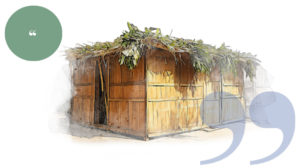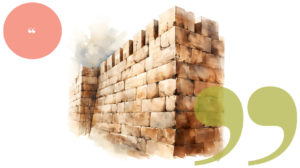Pink Balloons and Letting Go
| September 20, 2013I came to the point where I could hardly look at this principal. You ruined my child! And you call yourself an educator?

I was buried deep inside my coat closet, enmeshed in an attempt to create order from chaos when I was interrupted by the phone. Rabbi K., my son Yanky’s day school principal, summarily requested my presence in his office.
Frustrated, I climbed out from the depths. Why can’t we just deal with whatever it is over the phone? I wondered. While I drove, I worried.
Rabbi K. greeted me, grim-faced, closed his office door, and began, “Yanky approached a teacher with a pencil and said he would poke her eye out.”
I gulped, agreeing this was unacceptable behavior. We, the parents, would certainly deal with this, I assured Rabbi K.
“I’m suspending him. Yanky must go home with you now,” he told me.
Several days later, I got another phone call.
“When can Yanky come back to school?” I asked when I heard the principal’s voice.
“He cannot come back to school.”
I heard the words, but… “What?!”
“Yanky has serious issues that need to be dealt with. I wish you much brachah v’hatzlachah. If there’s any way I can be of help, please don’t hesitate to call me.”
I sat frozen, clutched the receiver. Could this be real? Wasn’t there supposed to be a process before a child is expelled from school? Meetings, interventions, planning … Our Yanky had just been expelled from the only frum school in our small town. What would we do? What could we do?
“Yanky,” I called, and my little boy bounded up to me from the playroom.
“That was Rabbi K. He said … that you can’t come back to school anymore.”
“Never?” Yanky’s brown eyes opened in disbelief. “No…”
And his tears began to stream as he fell into my arms, sobbing. We sat huddled together at the top of our basement steps, holding each other and crying for a long time.
So Yanky attended public school, boarding the big yellow bus every morning. A sheep among wolves, the only child there with a yarmulke and tzitzis, the only child who couldn’t participate in the “holiday” program, the only one who couldn’t eat the school’s hot lunches … It was a time of nisayon for all of us. Moving wasn’t a simple option either. We were settled here, our other children were thriving, and my husband had a good job.
I took Yanky to therapists and tried various treatments for his worsening ADHD and ODD. His negative behaviors escalated, becoming violent tantrums that left us drained and limp.
Are his behaviors worse because he hates being in public school? Rabbi K., this is all your fault! My anger simmered for years, growing to a rapid boil. I came to the point where I could hardly look at this principal. You ruined my child! And you call yourself an educator? Any time I saw him, and even when I didn’t, I raged. And I was known in my community as a gentle person, head of a chesed organization. No one knew of my dark side.
Years passed. Every so often I made the dreaded call, asking the day school if they would take Yanky back. Their answer remained a solid no. His issues were too big; he could not succeed there. The doors remained closed.
In sixth grade, we tried sending Yanky out of town to a yeshivah for kids like him. He had a mostly successful year, but by seventh grade, something went awry. He got kicked out of three schools that year, and we finally just brought him home and put him back in public school. Our hearts were broken anew.
Within a year, every vestige of Yanky’s Yiddishkeit was gone. Thanks a lot, Rabbi K. Maybe if you’d kept him in a kosher environment this would never have happened. Maybe.…
One year before Rosh HaShanah, I met with Rabbi K. I was tired of being consumed by anger; I wanted to get rid of it and get on with life. It was time to forgive.
“I’d like to forgive you,” I began. “But I need you to apologize.”
“I’m sorry for causing you pain,” he said. “But truth be told, I should have expelled him long before I did.”
If possible, my fury reached a new level.
When Rabbi K.’s wife got sick with a terminal illness, I was frightened.
Did my hatred cause this terrible thing to happen to you, Rabbi K.? I wanted you to leave our community, true, and never come back, but in good health. I never wanted your wife to get sick. I wondered and worried. How many stories had I read of people not having children or not finding their zivug because of issues like this, where one side was in pain from a wrongdoing and there hadn’t been reparation or resolution?
In the nursing home where I worked, a resident and I were talking.
“I learned to just let things go,” she told me one day as I sat beside her and listened. “I picture myself holding a pretty pink balloon, and then I let it go. I watch it float freely up to the clouds until I can’t see it anymore. There go all of my worries, concerns, stress. I just let them go.”
I’m going to try that.
As I davened, I’d envision my anger in that pink balloon, and feel a temporary relief as I watched it float away.
But it always came back.
And then it was the day of my third child’s wedding. “There’s an inyan for parents to be mochel everyone on the day of a child’s wedding,” my husband informed me.
I so want my son and his kallah to have a good life. I so want them to build a bayis ne’eman ad meah v’esrim in good health. I wanted our couple to have the best possible foundation and the most wonderful future. Could I do it? For them?
I took out my siddur. I closed my eyes and whispered, “I forgive you, Rabbi K. You were only the messenger. Okay, you could have handled things more professionally, more humanely. But Hashem obviously wanted Yanky and us to have these nisyonos, and ultimately, it’s all for the best. We know that. Mochel lach, mochel lach, mochel lach.…” Hot tears streamed down my face as I freed my heart of the anger that had been locked inside for the past nine years.
While we were away for our simchah, we heard about a yeshivah that catered to boys with issues like Yanky’s. They were willing to give him a try. And he was ready for a new start. We held our breath and came home without him.
A week later, we got a letter. Mazel tov! Yanky was accepted.
He’s still there, in a place where he is davening, wearing tefillin, eating kosher, keeping Shabbos, and learning Torah for the first time in years. I am afraid to hope, yet I boldly allow a flicker to kindle. And let it go on burning.
(Originally featured in Family First, Issue 306)
Oops! We could not locate your form.













